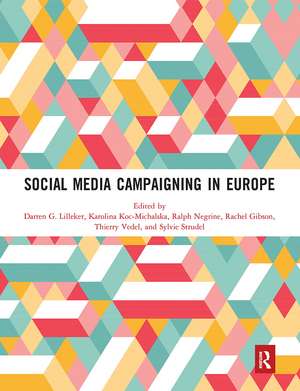Social Media Campaigning in Europe
Editat de Darren G. Lilleker, Karolina Koc-Michalska, Ralph Negrine, Rachel Gibson, Thierry Vedel, Sylvie Strudelen Limba Engleză Paperback – 18 dec 2020
This book will be of great interest to students of both politics and media studies. It was originally published as a special issue of the Journal of Information Technology & Politics.
Preț: 256.07 lei
Preț vechi: 324.46 lei
-21% Nou
Puncte Express: 384
Preț estimativ în valută:
49.01€ • 53.26$ • 41.20£
49.01€ • 53.26$ • 41.20£
Carte tipărită la comandă
Livrare economică 21 aprilie-05 mai
Preluare comenzi: 021 569.72.76
Specificații
ISBN-13: 9780367671327
ISBN-10: 0367671328
Pagini: 138
Dimensiuni: 210 x 280 mm
Greutate: 0.26 kg
Ediția:1
Editura: Taylor & Francis
Colecția Routledge
Locul publicării:Oxford, United Kingdom
ISBN-10: 0367671328
Pagini: 138
Dimensiuni: 210 x 280 mm
Greutate: 0.26 kg
Ediția:1
Editura: Taylor & Francis
Colecția Routledge
Locul publicării:Oxford, United Kingdom
Public țintă
Postgraduate and UndergraduateCuprins
1. Social media campaigning in Europe: Mapping the terrain Darren G. Lilleker, Karolina Koc-Michalska, Ralph Negrine, Rachel Gibson, Thierry Vedel, and Sylvie Strudel 2. "Beer is more efficient than social media" – Political parties and strategic communication in Austrian and Swiss national elections Ulrike Klinger and Uta Russmann 3. The role of gender in online campaigning: Swedish candidates’ motives and use of social media during the European election 2014 Linn A. C Sandberg and Patrik Öhberg 4. From hybrid media system to hybrid-media politicians: Danish politicians and their cross-media presence in the 2015 national election campaign Mark Blach-Ørsten, Mads Kæmsgaard Eberholst, and Rasmus Burkal 5. Brute force effects of mass media presence and social media activity on electoral outcome Marko Kovic, Adrian Rauchfleisch, Julia Metag, Christian Caspar, and Julian Szenogrady 6. When David and Goliath campaign online: The effects of digital media use during electoral campaigns on vote for small parties Carol Galais and Ana Sofía Cardenal 7. Sharing Is Caring! Investigating Viral Posts on Politicians’ Facebook Pages During the 2014 General Election Campaign in Hungary Marton Bene 8. Personalization of Politics Between Television and the Internet: Leader Effects in the 2013 Italian Parliamentary Election Diego Garzia
Notă biografică
Darren G. Lilleker is Associate Professor in Political Communication in the Faculty of Media and Communication at Bournemouth University, UK. His research focuses on the nexus between political campaigns and voter engagement, trust, and self-efficacy as conceptualized in his book Political Communication and Cognition (2014).
Karolina Koc-Michalska is Associate Professor at Audencia Business School and Associated Researcher at CEVIPOF Sciences-Po Paris, France. Her research focuses on the strategies of political actors in the online environment and citizens’ political engagement, where she employs comparative approach focusing on the U.S. and European countries.
Ralph Negrine is Emeritus Professor of Political Communication in the Department of Journalism Studies at the University of Sheffield, UK. His publications include The Transformation of Political Communication (2008) and The Political Communication Reader (with James Stanyer, 2007).
Rachel Gibson is Professor of Politics at the University of Manchester, UK. Her research focuses on how digital technologies are changing the way in which election campaigns are fought and won. She is interested in comparative research and has a particular focus on developments in the UK, the U.S., Australia, and France.
Thierry Vedel is a CNRS Senior Research Fellow with the Center for Political Research at Sciences-Po Paris, France.
Sylvie Strudel is Professor of the Political Sciences (Professeur des Universités) at Pantheon-Assas University, France, and Associated Researcher at Centre Marc Bloch de Berlin, Germany, and CEVIPOF Sciences-Po Paris, France.
Descriere
This book offers new perspectives on social media campaigning within European democracies, contributing to a more global, comprehensive understanding of how campaigning is affected, and might be enhanced, by developing an interactive digital strategy. It was first published as a special issue of the Journal of Information Technology & Pol
